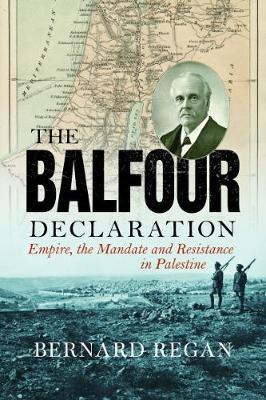AFOPA Book Review
Book Review
The Balfour Declaration: Empire, the Mandate and Resistance in Palestine
Author: Bernard Regan
Publisher: Verso Books (2017)
This excellent study interprets the infamous Declaration at the source of so much dispossession, bloodshed and suffering in the light of the colonial administration of an imperial protectorate exercised at the expense of an indigenous population in favour of European settlers. Thus, the brief, historic text is seen in relation to the implications which were its legacy. The perspective employed is one of historical materialism and classical theories of imperialism, which accordingly emphasize strategic and economic factors to explain cultural trends and political events.
Put simply, the project of establishing 'a Jewish national home' in Palestine was a stalking horse for the foundation of a British base athwart the lines of imperial communication and trade with the East, which would command amongst other things the emerging strategic commodity of oil: The Royal Navy had converted to oil from coal in 1912. Among the particular projects contemplated in 1915 was a rail link from the oil fields of the Caucuses and Iraq to the Mediterranean, terminating at Alexandretta or even Haifa. In either case, Palestine was strategic territory.
The purpose of the Declaration can thus be seen to be nothing less than the securing of the future of an empire. Zionism was a protégé to that larger end, born of racism, for Balfour not only disregarded Palestinian interests but used Jewish ones in an anti-Semitic function: the putative settlers were well down the European racial hierarchy and their re-location from Europe was a matter of mixed Judeo-Christian sympathy and antipathy. Palestinian resistance was shaped by a global capitalist socioeconomic context, as traditional elites and modernizing political forces struggled to negotiate the succession of British to Ottoman over-lordship. Eventually an Arab Revolt broke out in 1936, as Palestinian concern focused on British suzerainty as the key problem. The suffocation of the Revolt in 1939 was the pre-condition for the break-out of Zionist militias from Jewish enclaves against a disarmed native population in 1947-48.
Every phrase and term of the Declaration was carefully negotiated with the interplay of interests with the conduct of the imperialist war for global hegemony firmly in mind. November 1917 saw the nadir of the Great War, with the combatant nations fully engaged and desperate for the relief of a breakthrough. The British War Cabinet, lead by the `Eastener’ Lloyd George, looked to a major contribution in the Levant and from the United States. The Cabinet were anxious not to alienate influential pro-Zionist opinion in the USA lest it adversely affect financial and material support provided by President Wilson for the war effort. To this end the text of the Declaration was preventively submitted to Wilson himself.
As the Zionist colony in Palestine grew, development in the country became uneven. The promotion of industrialization favoured Jewish capital. The British supervised racially differentiated wage rates. The chapter on the socioeconomic features of the Mandate, which gave effect to the Declaration over two decades, is nothing short of fascinating.
Reviewed by Dr David Faber, Executive Member, Australian Friends of Palestine Association (AFOPA), 3 August 2018
View blog by TAG
- 1948
- 1967 War
- 29 November
- 3 goals
- 3D printing
- 5 ways
- 60 dead children
- 70 years
- AFOPA
- AFOPA Media Report
- AFOPA statement
- ALP
- APAN
- Abbas
- Absentee Property Law
- Adalah
- Adelaide
- Ahed Tamimi
- Airbnb
- Al-Aqsa Mosque
- Alabnese
- Albanese
- Amazon
- Amnesty International
- Annexation
- Anti-Palestinianism
- Antisemitism
- Apartheid
- Arab academics
- Attacks
- Australia
- Australian Government
- BDS
- BDS Campaign
- Balfour Declaration
- Bassem Tamimi
- Bedouin
- Beersheba
- Beirut
- Benjamin Netanyahu
- Berlin4Palestine
- Bernard Regan
- Bethlehem
- Biden
- Birzeir University
- Breaking the Silence
- Britain
- COSATU
- COVID-!(
- Canada




